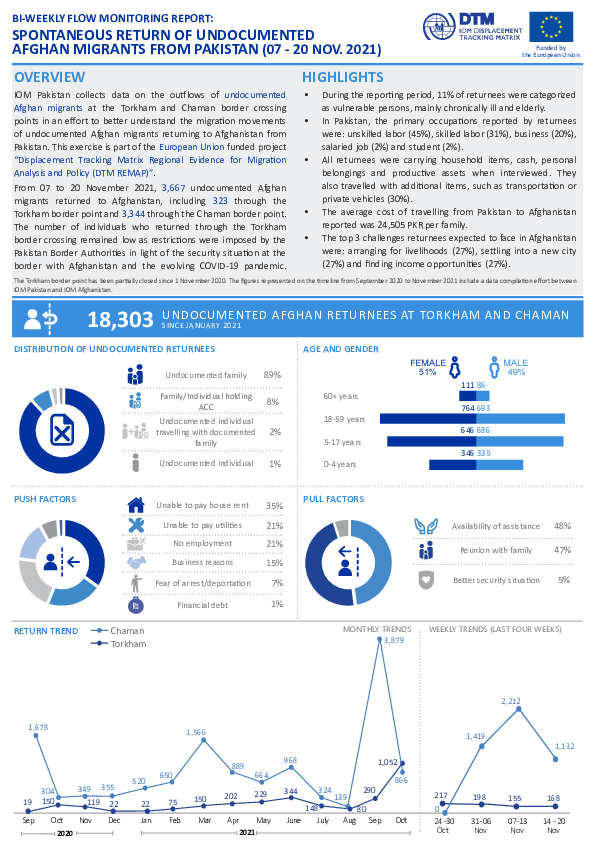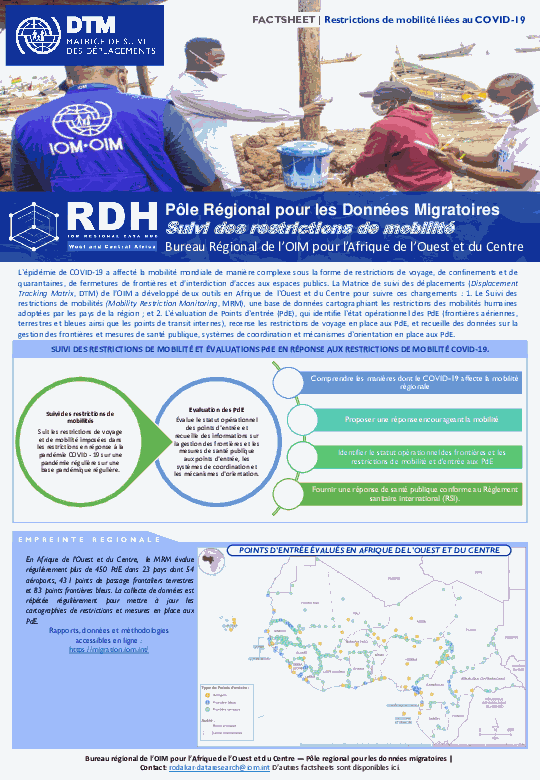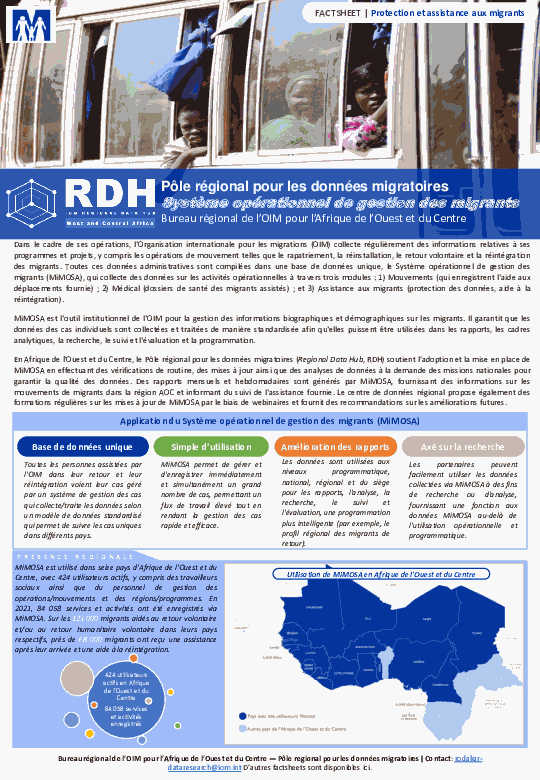-
Countries
-
Data and Analysis
-
Special Focus
-
Crisis Responses
IOM works with national and local authorities in order to gain a better understanding of population movements throughout Southern Africa. Through the setup of Flow Monitoring Points (FMPs), IOM seeks to quantify migration flows, trends and routes and to gain a better understanding of the profiles of observed individuals at entry, transit or exit points (such as border crossing posts, bus stations, rest areas, police checkpoints and reception centres). This report is an overview of the data collected in these FMPs from 1 to 31 January 2022.
Inter-regional migration from and within the Southern Africa is categorized along the following corridors. The Flow Monitoring Points (FMPs) were set-up in several key transit locations along the corridors to track the movements of passengers:
•Zimbabwe (Mutare) – Mozambique (Manica)
•Zimbabwe – Zambia (Chirundu)
•Zimbabwe – Botswana (Plumtree)
•Zimbabwe (Beitbridge) – South Africa
•Malawi (Mwanza) – Mozambique (Zobue)
•Malawi (Mulanje) – Mozambique
During January 2022, a total of 59,020 movements were observed across 35 FMPs in the region.
The Zimbabwe – South Africa corridor hosted the largest number of movements with 42,301 (72%) followed by the Malawi (Mwanza) – Mozambique (Zobue) corridor with 8,723 (15%) and the Zimbabwe – Zambia corridor with 3,174 movements reported (5%).

Contact
Jaime Paredes, jparedes@iom.int
Language
Spanish
Location
Ecuador
Period Covered
Aug 01 2021
Sep 30 2021
Activity
- Survey
- Flow Monitoring Survey
- Flow Monitoring
La región de América Latina y el Caribe es el principal destino población venezolana por diversos motivos. De acuerdo con datos de la Plataforma de Coordinación para Refugiados y Migrantes de Venezuela (R4V), 80% de los más de 5,6 millones de personas venezolanas residiendo en el extranjero se han establecido en la región. 1 Entre los países de la región que ha recibido un mayor número de población venezolana, se encuentra Ecuador. De acuerdo con datos de R4V, en la actualidad el país hospeda alrededor de 451.100 de personas venezolanas en su territorio.
Con el objetivo de monitorear el flujo de población venezolana en Ecuador, entre el 31 de agosto y el 26 de septiembre de 2021, se llevó a cabo el levantamiento de la Ronda 12 de la DTM, en 11 ciudades del país: Santo Domingo, Portoviejo, Manta, Guayaquil, Huaquillas, Loja, Cuenca, Ibarra, Tulcán, Quito y Lago Agrio. La selección de estos Puntos de Monitoreo de Flujo (PMF) se determinó con el apoyo y participación de informantes clave, entre ellos, las direcciones zonales del Ministerio de Relaciones Exteriores y Movilidad Humana, instituciones gubernamentales, agencias de las Naciones Unidas y organismos no gubernamentales que interactúan con la población venezolana.

Contact
DTM Colombia, DTMColombia@iom.int
Language
Spanish
Location
Colombia
Period Covered
Jan 01 2022
Jan 31 2022
Activity
- Flow Monitoring
Fuentede información: registros de entrada de beneficiarios de 24 alojamiento subica dos en los departamentos: Antioquia(65), Arauca(292), Atlántico(21) BogotáD.C (550), Bolívar(5), Casanare (1.226), Cauca (117), Cundinamarca (362), La Guajira (218), Nariño (1.769), Norte de Santander (3.572), Santander (245), Tolima (194), Valle del Cauca (337).

Contact
iomisbdtmremapteam@iom.int and dtmremapsupport@iom.int.
Language
English
Location
Pakistan
Period Covered
Nov 07 2021
Nov 20 2021
Activity
- Flow Monitoring
IOM Pakistan collects data on the outflows of undocumented Afghan migrants at the Torkham and Chaman border crossing points in an effort to better understand the migration movements of undocumented Afghan migrants returning to Afghanistan from Pakistan. This exercise is part of the European Union funded project “Displacement Tracking Matrix Regional Evidence for Migration Analysis and Policy (DTM REMAP)”. From 07 to 20 November 2021, 3,667 undocumented Afghan migrants returned to Afghanistan, including 323 through the Torkham border point and 3,344 through the Chaman border point. The number of individuals who returned through the Torkham border crossing remained low as restrictions were imposed by the Pakistan Border Authorities in light of the security situation at the border with Afghanistan and the evolving COVID-19 pandemic.

Contact
iomisbdtmremapteam@iom.int and dtmremapsupport@iom.int.
Language
English
Location
Pakistan
Period Covered
Nov 21 2021
Dec 04 2021
Activity
- Flow Monitoring
IOM Pakistan collects data on the outflows of undocumented Afghan migrants at the Torkham and Chaman border crossing points in an effort to better understand the migration movements of undocumented Afghan migrants returning to Afghanistan from Pakistan. This exercise is part of the European Union funded project “Displacement Tracking Matrix Regional Evidence for Migration Analysis and Policy (DTM REMAP)”. From 21 November to 04 December 2021, 2,947 undocumented Afghan migrants returned to Afghanistan, including 421 through the Torkham border point and 2,526 through the Chaman border point. The number of individuals who returned through the Torkham border crossing remained low as restrictions were imposed by the Pakistan Border Authorities in light of the security situation at the border with Afghanistan and the evolving COVID-19 pandemic.
Cette fiche d'information présente le Projet sur les migrants disparus (Missing Migrants Project, MMP) en Afrique de l'Ouest et du Centre, de même que le rôle du Pôle régional pour les données migratoires (Regional Data Hub, RDH) du Bureau régional de l'OIM pour l'Afrique de l'Ouest et du Centre dans le cadre du MMP.
Cette fiche d'information fournit un aperçu des actions, initiatives et garde-fous mis en place par le Pôle régional pour les données migratoires (Regional Data Hub, RDH) du Bureau de l'OIM pour l'Afrique de l'Ouest et du Centre afin de garantir et assurer la protection des données dans le cadre des activités de collecte, analyee et partage des données, ainsi que les conditions nécessaires au partage des données.
Cette fiche d'information fournti un aperçu des outils de collecte de données mis en oeuvre dans le contexte de la pandémie de COVID-19 en Afrique de l'Ouest et du Centre, de même que le rôle du Pôle régional pour les données migratoires (Regional Data Hub, RDH) du Bureau régional de l'OIM pour l'Afrique de l'Ouest et du Centre en relation avec ces outils.
Cette fiche d'information fournit un aperçu des activités de collecte, analyse et diffusion de données relatives aux migrations conduites par la Matrice de suivi des déplacements (Displacement Tracking Matrix, DTM) en Afrique de l'Ouest et du Centre, de même que le rôle du Pôle régional pour les données migratoires (Regional Data Hub, RDH) du Bureau régional de l'OIM pour l'Afrique de l'Ouest et du Centre en relation avec ces activités.
Cette fiche d'information présente l'application et la mise en place du Système opérationnel de gestion des migrants (Migrant Management Operational System Application, MiMOSA) en Afrique de l'Ouest et du Centre, de même que le rôle du Pôle régional pour les données migratoires (Regional Data Hub, RDH) du Bureau régional de l'OIM pour l'Afrique de l'Ouest et du Centre dans de déploiement de MiMOSA dans la région.






